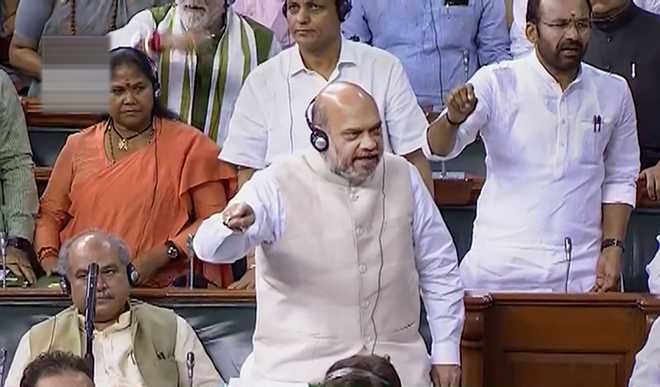"The object of terrorism is terrorism. The object of oppression is oppression. The object of torture is torture. The object of murder is murder. The object of power is power. Now do you begin to understand me?", said George Orwell in Nineteen Eighty-four.
The Anarchical and Revolutionary Crimes act or the Rowlatt Act was a legislation introduced in British India that ruled that any Indian could be detained without trial. This was preventive detention, meaning that the government would imprison and indefinitely detain any citizens without any crime having been committed, and without obeying any, let alone due legal process of trial, hearing, and prosecution. In its essence, it implied that if anyone in the administration suspected that a citizen might commit a crime at some point in the future, that person can be jailed (before the crime has been committed). Indians were rightfully livid, and the legislation was summarised as: 'No dalil, no vakil, no appeal’ (No argument/defense, No advocate, No judicial appeal or plea).
Mahatma Gandhi, among other Indian leaders, was extremely critical of the Act and argued that not everyone should be punished in response to isolated political crimes. He organized mass hartals (refusal to work respective duties, trade and occupations and thus letting public institutions temporarily collapse) and called on people to peacefully not cooperate with the British Raj. He summoned Indians to convene a Satyagrah (resolutely nonviolent protest) that ultimately snowballed into the Non-Cooperation Movement.
It was partly in response to the agitated ramifications of this draconian piece of legislation, The Anarchical and Revolutionary Crimes Act of 1919, popularly known as the Rowlatt Act or Black Act, that the infamous Jallianwala Bagh incident came to transpire.
Last week, the 2019 Amendments to the Unlawful Activities Prevention Act were passed in the Indian Parliament. The president approved it this Friday. It imbues the government with the power to designate any organisation as a terrorist organisation, if it deems it fit to do so, and defines (in extremely broad, lose and unspecified terms and dangerously unnuanced fashion) and empowers prevention of the said 'unlawful activities'.
It also enables the government to earmark someone as a terrorist with such arbitrarity that due trial, prosecution and conviction can be notwithstood and outright disregarded. The law comes in wake of amendment to the Right to Information Act, seen as a quasi-fundamental Right to citizens. This pattern of prompt amendments to laws vital to freedom and transparency, are seen as attempts to tamper with democracy and violate the de facto powers vested in the citizenry by the constitution and the democratic setup.
What is alarming, is that the government already possesses the right to prosecute someone who indulges in terrorist activities, vide Chapter Four of the existing act, whereby arrests obeying due process, and subsequent conviction by the judiciary based on substantiating evidence, can be fluidly made. Indian apical legal system, in spite of its flaws, is a well-oiled machinery, one of the fairest and most competent in the world. So amending the existing provisions seems to accomplish no relevant protective purpose at all.
The vital and pernicious difference however, is the ability to arbitrarily label an individual citizen as terrorist on wide bases or none at all. This can be used to enact a veritable "name-and-shame" campaign, a systematic smear campaign whereby political opponents, critics and dissidents can potentially be defamed and their kith and kin forced to withstand popular ostracisation and endure prolonged mental toll. It can spell doom for relatives, who'll risk outright social boycott and jeopardise their very sustenance. Social stigma is a dangerous parasite in India - it cripples the individual, starving them mentally and emotionally. Designations become ideal tools for exacting vendetta by exerting remote mental torment and emotional deprivement.
For the mere sake of this "designation", a public label, the government is motivated to holistically burden all concerned institutions, from the valuably ration-timed Parliament to the pertinent enforcement authorities with a superfluous legislation. The motivation behind undertaking this trivial-seeming toil is not very hard to speculate about. It can make earmarked dissidents crumble - having difficulty finding a place to inhabit, making it impossible to admit their children to schools, or survive the shaming, making it impossible to get conventional jobs, and so on. In essence, affiliation or link with a terror outfit or faction, and evidence of direct perpetration of terror activities is not a necessary incriminating ground to explicitly declare and prosecute someone as a terrorist.
In his elucidation of the bill in the assembly, Indian Home Minister Amit Shah stated that those who try to disseminate "the literature and theory of terrorism", would also be labelled as terrorists, and treated such. He audaciously proclaimed propaganda to be the root of terror. With imprisonment of community leaders and social workers and reformers, involved in tribal (indigenous people's) movements, dalit movements, and marxist preaching, it is ghastly to wonder, the predicament of their likes once the Act comes into force. The Act also grants the National Investigative Agency extraordinary powers to enforce its will, and likely indirectly that of the ruling administration supervising them. All in all, the law is a perfect instrument of suppression - one that curbs the scope of individual rights and government organs alike, and goes against everything that a democracy stands for, assailing its very pillars, and undermining its core values and virtues.
The law is reminiscent of the draconian ways of the British Raj, whereby any popular peaceful but resolute dissident, whose growing influence perturbed the colonial authorities, would be branded a terrorist, in a bid to enact his social boycott, at least a preemptive, safety-considerate distancing, and be accused of indulging in a conspiracy with no substantial evidence. It ticks out all the relevant checkboxes of historical indicators of fascism, and is an early instalment in the systematic exploitation of majoritarianism to compromise and jeopardise the world's largest democracy.


